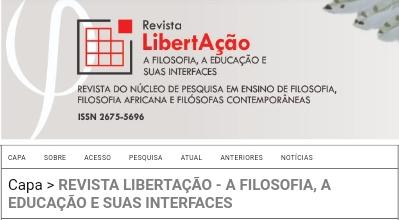O Projeto Pedagógico do Curso de Filosofia da UEPB: o que dizem a Base Nacional Comum Curricular e o Programa de Residência Pedagógica da CAPES sobre a formação do professor
LibertAção - Volume 1 N 1 2020 • Revista LibertAção
Autor: Carolina Cavalcanti Bezerra; Valmir Pereira
Resumo:
O objeto deste artigo versa sobre a formação do professor no Projeto Pedagógico do Curso de Filosofia – PPCF, da Universidade Estadual da Paraíba - UEPB. Para dialogar com a questão, buscamos na Base Nacional Comum Curricular – BNCC e no Programa de Residência Pedagógica – PRP indícios da pormenorização da questão. Isto porque, nos interessa entender como as políticas públicas do Governo Federal vem se dedicando à formação de professores, especialmente para o campo das Ciências Humanas, de forma a direcionar diretrizes aos projetos pedagógicos das instituições de ensino superior, que vem sendo atualizados para atender as novas demandas. Como as normativas influenciam na reescrita de projetos pedagógicos de cursos de graduação? Como a formação dos futuros professores de Filosofia e das demais humanidades é enxergada pelas políticas públicas? Dedicamos nossa revisão bibliográfica inicial a identificar à questão específica da formação do professor, presente ou não nos documentos, propondo uma breve análise comparativa e argumentativa. Essas são algumas das inquietações que temos sobre a atual Política Nacional de Formação de Professores e que nos ensejaram na leitura do PPCF, da BNCC e do PRP, com o intuito de traçar uma linha de raciocínio sobre uma possível política para a formação do professor. Propomos uma leitura pelo viés mercadológico e nesta incipiente análise dos documentos, verificamos que os alunos vêm sendo preparados para o mercado de trabalho e não para a reflexão crítica social que cerca a educação nacional e a formação humanística e ética proposta pelos documentos e, em especial pelo PPCF da UEPB. Ao final do artigo deixamos algumas possíveis leituras sobre o atual modelo de educação pública que gostaríamos de compartilhar, sugerindo assim novas discussões sobre a temática.
Abstract:
The object of this article is about teacher education in the Pedagogical Project of Philosophy Course, of Paraíba State University. To dialogue with this question, we sought the Common National Curriculum Base and the Pedagogical Residence Program evidences of the detail of the issue. This is because, we are interested in understanding how the Federal Government’s public policies have been dedicated teacher training, especially in the field of the Humanities, directing guidelines to educational projects of educational institutions which has been updated to meet new demands. How do normative influences in the rewriting of pedagogical projects of undergraduate courses? How is the formation of future teachers of Philosophy and other Humanities seen by public policies? We devoted our initial literature review to identify the specific issue of teacher education, whether or not present in the proposing a brief comparative and argumentative analysis. These are some of our concerns about the current National Teacher Training Policy and that gave us the opportunity to read the Pedagogical Project of Philosophy Course, the Common National Curriculum Base and the Pedagogical Residence Program, to draw a line of reasoning on a possible policy for teacher. We propose a reading by the market bias and in this incipient analysis of the documents, we find that students are being prepared for the job market and not for the social critical reflection that surrounds national education and training humanistic and ethical approach proposed by the documents and in particular by the Paraíba State University Pedagogical Project of Philosophy Course. To the end of the article we leave some possible readings about the current model of public education that we would like to share, thus suggesting further discussions on the thematic.
ISSN: 2675-5696
Texto Completo: http://revista.uepb.edu.br/index.php/ENFIMAFA/article/view/5162/3430
Palavras-Chave: Filosofia. Política Nacional de Formação de Professores. Base Nacional Comum Curricular. Programa de Residência Pedagógica.

